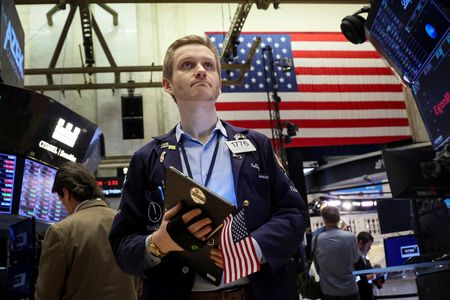
By Chuck Mikolajczak
NEW YORK (Reuters) – U.S. stocks pared gains on Wednesday on the heels of a policy announcement by the Federal Reserve that raised interest rates to meet market expectations as the central bank attempts to cool rising inflation without tipping the economy into a recession.
The Federal Reserve raised its target interest rate by three-quarters of a percentage point and projected a slowing economy and rising unemployment in the months to come.
Fed Chair Jay Powell is scheduled to speak at his press conference at 2:30 pm EDT (1730 GMT).
“The Fed is willing to let the unemployment rate rise and risk a recession as collateral damage to get inflation back down,” said Brian Jacobsen, senior investment strategist at Allspring Global Investments in Menomonee Falls, Wisconsin.
“This isn’t a Volcker-moment for Powell given the magnitude of the hike, but he is like a Mini-Me version of Volcker with this move,” he added in reference to former Federal Reserve Chairman Paul Volcker, who acted aggressively to sharply raise interest rates to stamp out inflation in the late 1970s.
The Dow Jones Industrial Average rose 15.11 points, or 0.05%, to 30,379.94, the S&P 500 gained 14.48 points, or 0.39%, to 3,749.96 and the Nasdaq Composite added 124.21 points, or 1.15%, to 10,952.56.
Stocks initially moved sharply higher after the announcement before quickly reversing course.
Investors had quickly raised their expectations that the central bank would hike rates by 75 basis points (bps) over the past several days following a stronger than expected reading of consumer prices on Friday. It had previously been widely anticipated the Fed would announce a raise of 50 bps, a rapid swing in expectations that has triggered a violent selloff across world markets.
Fueling the expectation for a larger hike were forecasts changes by analysts at major banks, including those at JP Morgan and Goldman Sachs, which both projected a 75 bps rate hike by the Fed. Investors have since rushed to reprice their bets.
Growing worries about surging inflation, higher borrowing costs, slowing economic growth and corporate earnings have kept equities under pressure for most of the year.
On Monday, the benchmark S&P 500 marked a more than 20% decline from its most recent record closing high, confirming a bear market began on Jan. 3, according to a commonly used definition.
Earlier economic data on Wednesday showed U.S. retail sales unexpectedly fell 0.3% in May as motor vehicle purchases declined amid shortages and record high gasoline prices pulled spending away from other goods, well short of expectations calling for a 0.2% rise.
Among individual stocks, Citigroup rose 2.24% to lead gains on the S&P 500 banks index, while Nucor Corp advanced 0.72% after it forecast upbeat current-quarter profit on strong steel demand.
Boeing Co surged 6.84% after China Southern Airlines Co Ltd conducted test flights with a 737 MAX plane for the first time since March, in a sign the jet’s return in China could be nearing as demand rebounds.
(Reporting by Chuck Mikolajczak)

